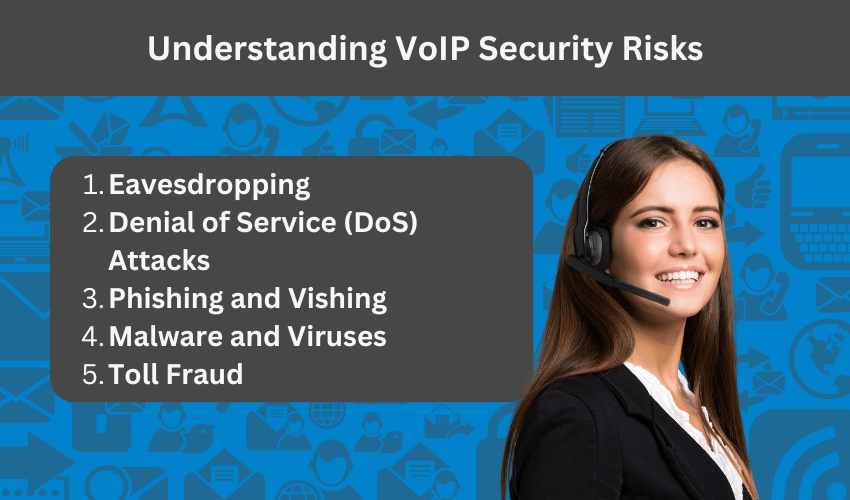
The Evolution of VoIP Technology and Equipment: Transforming Telecommunications
VoIP technology is revolutionizing the telecom industry. Learn about its transformative journey and how it benefits your communication needs!
Phone Service USA - VoIP - Top VoIP Security Best Practices to Protect Your Business
VoIP systems, like any internet-based technology, are susceptible to various security risks. Understanding these risks is the first step in protecting your business communications.
Also Read:

Eavesdropping is a major security risk for VoIP systems. Unauthorized parties can intercept calls, gaining access to sensitive information. This can occur if data packets are not properly encrypted. To prevent this, use strong encryption protocols like Secure Real-time Transport Protocol (SRTP) to protect voice data.
DoS attacks overwhelm a VoIP network, causing service disruptions. These attacks flood the network with excessive traffic, making it unusable for legitimate users. To counter this, implement robust network security measures, such as firewalls and intrusion detection systems (IDS).
Phishing and vishing (voice phishing) exploit VoIP systems to deceive users into divulging sensitive information. Phishing involves fraudulent emails directing users to fake websites, while vishing uses phone calls to impersonate legitimate entities. Educating employees on recognizing and avoiding these attacks is crucial.
Malicious software can infect VoIP systems, leading to data breaches and system failures. VoIP endpoints can be targeted by malware exploiting vulnerabilities. Protect against this by ensuring all devices have up-to-date antivirus software and security patches.
Toll fraud involves unauthorized use of your VoIP services to make long-distance calls, leading to financial losses. Attackers gain access to the system and make calls at your expense. Implement strong authentication measures and monitor call patterns to detect and prevent toll fraud.
By recognizing these potential threats, you can take proactive measures to protect your VoIP system.

Strong authentication measures are crucial for securing access to your VoIP system:
Implementing Multi-Factor Authentication (MFA) adds an extra layer of security to your VoIP system. MFA requires users to provide two or more verification factors to gain access, such as a password plus a one-time code sent to a mobile device. This reduces the risk of unauthorized access, as an attacker would need to compromise multiple authentication methods to breach the system.
Enforcing secure password policies is essential for protecting your VoIP system. Encourage users to create strong, unique passwords that include a mix of upper and lower case letters, numbers, and special characters. Implement regular password updates and avoid the use of easily guessable passwords. Additionally, consider using password managers to help users generate and store complex passwords securely.
Role-Based Access Control (RBAC) limits access to your VoIP system based on user roles and responsibilities. By assigning permissions according to job functions, you can ensure that only authorized personnel have access to sensitive features and data. This minimizes the risk of internal threats and helps maintain a secure environment. Regularly review and update access controls to reflect any changes in roles or responsibilities within your organization.

To protect your VoIP system from potential threats, it is essential to implement effective security measures. These measures will help safeguard your business communications and ensure the integrity and confidentiality of your data.
Encryption is a critical security measure for VoIP systems. It protects your voice data during transmission by converting it into a secure format that unauthorized parties cannot easily intercept or decipher. Key protocols to use include:
Implementing strong authentication measures is crucial for preventing unauthorized access to your VoIP system. Consider the following:
Enhancing network security is vital for protecting your VoIP infrastructure. Essential steps include:
Conduct regular security audits to assess the effectiveness of your VoIP security measures. Continuous monitoring can help detect and respond to security incidents promptly. Use monitoring tools to:
Educating and training your employees on VoIP security best practices is essential for maintaining a secure system. Effective strategies include:
By implementing these security measures, you can significantly reduce the risk of security breaches and protect your VoIP system from potential threats.

Implementing best practices for VoIP security ensures that your business communications remain secure and efficient. Here are some essential strategies to enhance your VoIP security.
Keeping your VoIP software up to date is crucial for maintaining security. Software updates often include patches for known vulnerabilities and improvements in security features. Regularly update:
Configuring your network securely can prevent unauthorized access and potential breaches. Key practices include:
Quality of Service (QoS) settings ensure that VoIP traffic gets priority over other types of network traffic, improving call quality and reducing latency. Key steps include:
Using secure VoIP protocols enhances the security of your communications. Essential protocols include:
Conducting regular security audits helps identify vulnerabilities and areas for improvement. Key components of an audit include:
Educating your employees about VoIP security is crucial for preventing human error and social engineering attacks. Effective training programs should cover:
By following these best practices, you can enhance the security of your VoIP system and protect your business communications from potential threats.
Securing your VoIP system is essential for protecting your business communications from potential threats. By understanding VoIP security risks and implementing robust security measures and best practices, you can ensure that your VoIP system remains safe, efficient, and reliable.
At Phone Service USA, we understand the importance of secure and efficient business communications. Our VoIP solutions are designed to provide robust security features and support, ensuring your business stays connected and protected. Contact us today to learn more about how we can help you implement a secure VoIP system tailored to your business needs.

VoIP technology is revolutionizing the telecom industry. Learn about its transformative journey and how it benefits your communication needs!

Looking for a VoIP service provider? Our comprehensive guide details what to consider to make an informed decision. Start optimizing your communication today!

Maximize efficiency and client trust with small business telephone services. This article reveals the reasons they’re indispensable. Read now for transformational strategies!